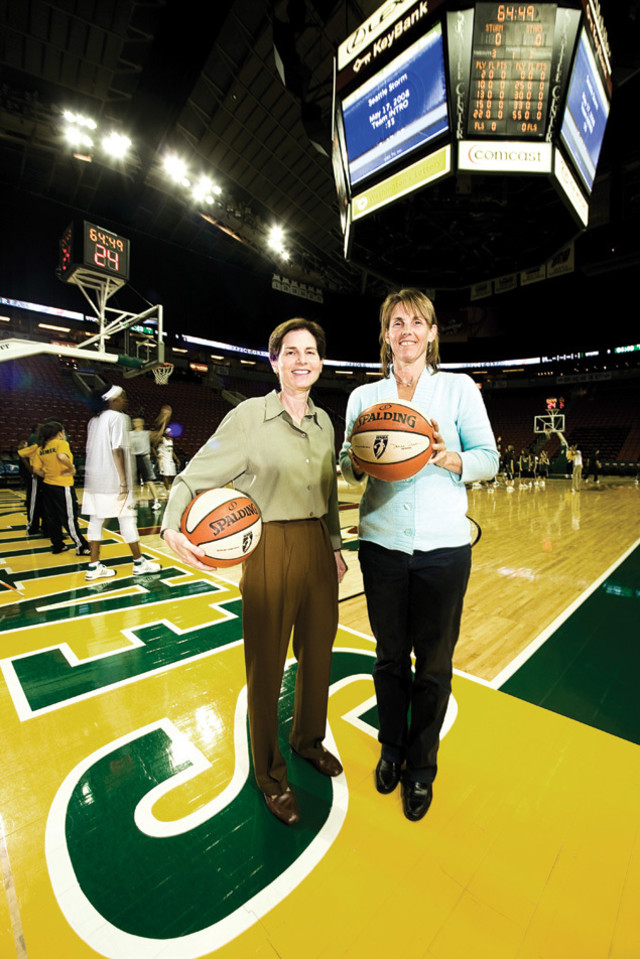Force 10 Is With Them

IN BASKETBALL A POINT GUARD’S JOB is to run the offense: control the ball, get it to the right player at the right time, help others score rather than scoring yourself. The -Seattle Storm already had one of the best point guards in the Women’s National Basketball Association, Sue Bird. Now it has another: Anne Levinson, chair of Force 10 Hoops, the group that bought the Seattle Storm from new Sonics owner Clay Bennett. Though she’s far smaller than most on-court point guards, Levinson demonstrated classic teamwork when she gathered three well-placed fellow Storm fans and orchestrated the buyout. But she never sought the limelight; at first she wasn’t interested in being an owner at all. “The ultimate goal,” she says, speaking as a longtime season ticket-holder, “was just to keep the Storm in Seattle.”
At the team’s April Media Day, Levinson showed Bird-worthy handoff skills, meeting each question with a nod to one of the other new owners. Not that she couldn’t answer herself; though she’s a rookie team owner, she played like a veteran, deftly filling any gaps in others’ answers. She can seem at once warm and approachable and excruciatingly precise. At a May event, a fan asked if the new owners would attend games. Levinson painstakingly explained why every owner might not make every away game. Co-owner Lisa Brummel chided her lawyerly style, and everyone chuckled.
Such diligence reflects Levinson’s long public-service résumé: Seattle deputy mayor, Washington Utilities and Transportation Commission chair, district court judge, and deputy director of the ill-fated monorail project (from which she miraculously emerged unscathed). Female team owners are extremely rare, even in the WNBA, and Levinson’s background makes her an even rarer bird. But sports were pivotal in shaping her career. Levinson played field hockey as a student at the University of Kansas and filed a successful Title IX lawsuit to secure more scholarships for female athletes. That foray into legal process sparked her interest, and she switched to studying law. “What I learned as an athlete—teamwork, collaboration—has influenced my career and the choices we make as team owners,” she explains.
Levinson showed Bird-worthy handoff skills, fielding questions with a nod to another owner.
Those qualities, plus her commitment to the community and track record of getting things done, helped Levinson save the Storm from becoming collateral damage in the biggest local dustup since, well, the monorail. Levinson reached out to fellow Storm fans Lisa -Brummel, Ginny Gilder, and Dawn Trudeau to find a solution. All were student athletes -(Gilder won Olympic silver in rowing in 1984), and all are local business and philanthropic powerhouses. “To their credit,” Levinson says, “they did not hesitate.” Force 10 Hoops—“force 10” is the meteorological point at which bad weather becomes an official storm—was born.
Force 10 has already netted a few points. It signed phenoms Sheryl Swoopes, Swin Cash, and Yolanda Griffith, set a regular-season attendance record at the May opener, and won a Seattle Business Association “social change” award. Levinson and partners have meanwhile been training staff, upgrading KeyArena’s facilities for families, and finding sponsors, such as the lesbian cruise line Olivia, to keep ticket prices down. So how about winning a second WNBA championship, something that’s eluded the Storm since 2004? Win or lose, for the new owners it’s about more than the game: It’s about building community and giving young women opportunities. “What we’re doing carries an important message that goes well beyond sports,” says Levinson.
After that record opener, the players gathered for a celebratory huddle. One broke away and dragged the new owners in. They were just four more members of the team.




